Maalam and me: the power of Gnaoua
Master musicians send Darren Loucaides into a trance at Morocco’s Gnaoua World Music Festival.
While reclining amongst plush cushions on a sunbathed rooftop, the noise and revelry of a music festival don’t much appeal. I take a sip of mint tea and another puff from the hookah – perks of staying at Marrakech Rouge, a tranquil riad in the heart of the city’s fabled souks. “Why on earth would I want to leave this?” I murmur, exhaling a cloud of fragrant smoke.
But the other travellers here say that the festival is amongst the most important for world music. That artists and bands from throughout Africa, the Middle East and far beyond come to perform at what has become Morocco’s premier event of the year. That it takes place in the seaside town of Essaouira on the Atlantic coast amidst golden beaches and ancient architecture – and that it’s happening now.
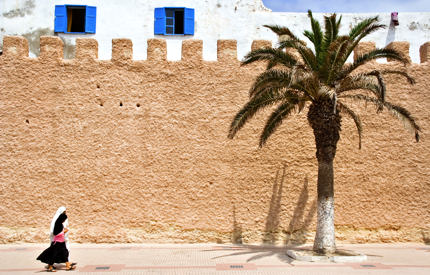 Essaouira is one of Morocco's most atmospheric coastal towns
Essaouira is one of Morocco's most atmospheric coastal townscacafuegos / Thinkstock
I’ve come to Morocco to relax, not for a festival… but finally their excitement begins to infect me. I reason that this is clearly a case of being in the right place at the right time. Before I know it, I’m in a jeep bound for Essaouira and the Gnaoua World Music Festival.
I haven’t even heard of the Gnaoua before, but one of the girls in our group is writing her university dissertation on them. She spends much of the three-hour jeep ride from Marrakech (the buses were fully booked a week ago) describing their fascinating culture. With roots in the slaves that were brought over the Sahara centuries ago, the Gnaoua became mixed with Berbers and Arabs. After converting to Islam, their time-old beliefs were fused with Muslim teaching; their healing ceremonies, in which spirits are invoked to possess the stricken, combine Sufism with witchcraft. They remain a closely guarded mystery, but the music derived from the rites is very much out in the open – not least thanks to the festival.
 Artists from all over the world perform at the Gnaoua Festival
Artists from all over the world perform at the Gnaoua FestivalKarim Tibari / Gnaoua World Music Festival
Attracting almost half a million people, the ‘Festival Gnaoua et Musiques du Monde’ enters its 17th year this June. Artists from all over Morocco, as well as West Africa, Pakistan, France, Cuba and New Orleans, gather to perform African rhythms, jazz, rock and hip hop. The event is made all the more poignant by the fact that some of the countries represented – Mali, for example, which boasts a rich musical tradition that’s presently under threat – have been experiencing heartbreaking sectarian turmoil. But Gnaoua Festival is a celebration of Africa, and particularly of Morocco’s African roots.
Dating back to the 1960s when Jimi Hendrix, Mick Jagger and Cat Stevens all visited, Essaouira’s hippy legacy greets me on arrival. “Space cakes! Space cakes!” a street seller yells, running over with a tray full of mind-altering treats. As a waft of fresh fish reaches my nostrils, however, I’m keen to try a different kind of local delicacy.
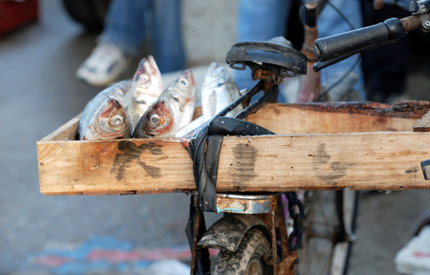 Essaouira centres round a thriving fishing industry
Essaouira centres round a thriving fishing industryBeatrice Preve / Thinkstock
Once a legendary port by the name of Mogador, Essaouira still centres round a thriving fishing industry, and the seafront is lined with little restaurants serving up the daily catch. I watch as a mixture of sea bream, calamari, sardines and prawns is cooked on a charcoal grill, before being loaded onto a huge platter and brought to me with slices of lemon and warm bread.
I’d like nothing more after such a lunch than to while away the afternoon in the sun. But the parade is about to begin, which marks the start of the festival. Under one of the city’s honeyed archways – a remnant of the Portuguese battlements built before the Alaouite sultans took over – I watch the procession, which is headed by two dozen or so fearsome-looking horsemen. Wave after wave of dancing troupes follow, each differently arrayed in an assortment of brightly coloured robes and glimmering gems, while beating drums, rattling shakers and blowing flutes. All the 25 Gnaoua musical brotherhoods are here, as well as representatives from many of Morocco’s diverse ethnic groups. A huge crowd watches on, many joining the parade that leads into the wide central square, Place Moulay Hassan.
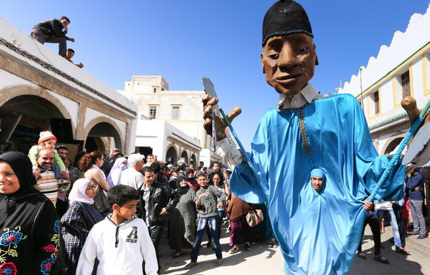 A colourful parade marks the start of the festival
A colourful parade marks the start of the festivalSabir El Mouakil / Gnaoua World Music Festival
After a brief respite back in my hotel, I find a tiny music shop across on Rue Kowait in the middle of Essaouira’s maze of lanes and alleyways. It’s filled with traditional instruments, some in the process of being crafted from the local thuya wood. The shop owner turns out to be a bit of a maalem – master musician – and with his long fingernails he begins plucking a stringed instrument known as a guimbri. His friend begins to sing, softly at first as though in a trance, but rising steadily towards a feverish pitch. Even when it’s not hosting the Gnaoua Festival, Essaouira truly lives and breathes music.
Finally, primed by this impromptu performance, I head for the main action. There are a few intimate shows during the festival in little bars requiring tickets, but the public concerts are free – one of the stages is set up on the beach. The centrepiece is in Place Moulay Hassan. A vast gathering is here – lots of young Moroccan men, a few hippyish westerners, some families, all dancing happily – to watch a Senegalese group. You have to beware of pickpockets, but the atmosphere is exhilarating. During a song that lasts almost 10 minutes, the percussion builds gradually from a smattering to a frantic cacophony, before finally climaxing with a release of belted vocals and explosive drums that draws an ecstatic response from the audience.
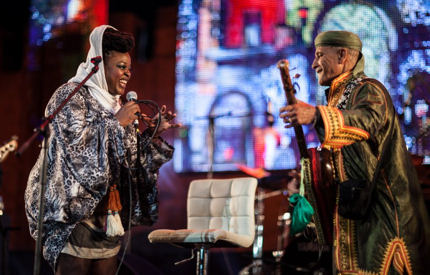 Head to Place Moulay Hassan for the main action
Head to Place Moulay Hassan for the main actionKarim Tibari / Gnaoua World Music Festival
The next day is a late start, but I start by wandering the souks, which are calmer and friendlier than Marrakech’s. I also scale the old ramparts on which Orson Wells filmed Othello, before walking along the sunny windswept beach. Eventually I arrive at the Jimi Hendrix Café which, far from being an opportunistic tourist trap, is little more than a warren of psychedelic murals, manned by a wary old man. Nearby are the half-consumed ruins said to have inspired Hendrix’s 'Castles Made of Sand' (though apparently he wrote it two years before visiting Essaouira).
That night I head back to the main square, this time observing the festival from a rooftop bar, Taros. It’s glitzy, packed out with very stylish Moroccans clutching glasses of wine and cocktails. But the real luxury is being able to watch the dozen or so musicians below – led by a powerful woman vocalist – while the sun fades ochre and purple behind the stage. I might be back reclining on a rooftop, but Marrakech feels far away.
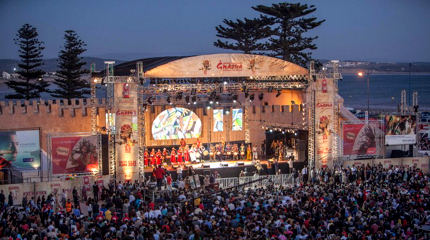 After dark, join the crowds or watch from a rooftop bar
After dark, join the crowds or watch from a rooftop barGnaoua World Music Festival
-------------------------------------------------------------------------------------
NEED TO KNOW
Getting there
Flights from London to Marrakech start from around £130 with Ryanair. Essaouira is less than a three-hour drive from Marrakech, with buses going daily.
About the festival
This year’s Gnaoua World Music Festival takes place 12-15 June 2014. Concerts taking place at several indoor venues in Essaouira require tickets; concerts in outdoor stages, including the main stage at Place Moulay Hassan, are free to enter.
Do you have any Feedback about this page?
© 2026 Columbus Travel Media Ltd. All rights reserved. No part of this site may be reproduced without our written permission, click here for information on Columbus Content Solutions.






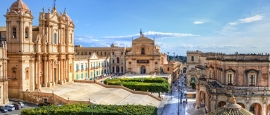


 You know where
You know where